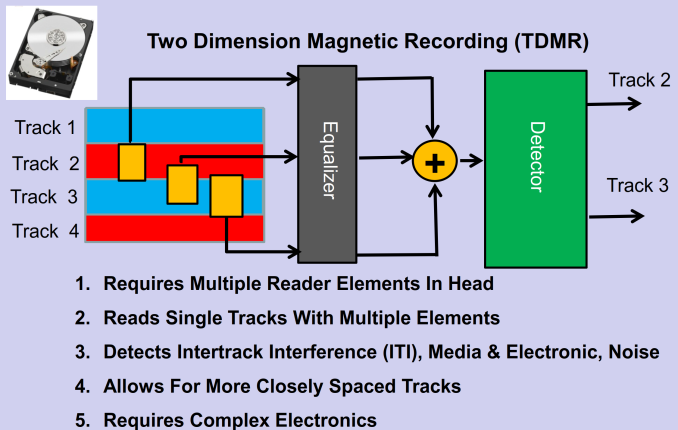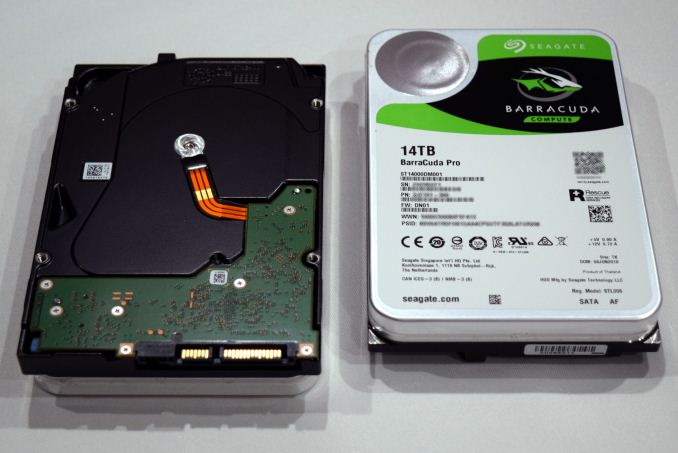Seagate BarraCuda Pro 14TB HDD Review: Massive Storage for Desktops
by Ganesh T S on September 10, 2018 8:01 AM ESTMiscellaneous Aspects and Concluding Remarks
The BarraCuda Pro 14TB drive helps Seagate retain their pole position in terms of offering the highest capacity drives for desktops and home consumers. Over the last three years, they have consistently been able to raise the bar, starting from 10TB, on to 12TB, and now, 14TB. Like the 12TB version from last year, the 14TB version also features eight PMR platters in a helium-filled sealed enclosure. The key to the increase in areal density lies in two-dimensional magnetic recording (TDMR). Prior to offering some concluding remarks, a brief look at TDMR could help some readers in appreciating Seagate's technological advancements that have resulted in the BarraCuda Pro 14TB drive.
Two-Dimensional Magnetic Recording
Hard drives store data in platters with a magnetic medium. A platter has magnetic grains spread all over, and each bit is stored in a magnetic region with hundreds of magnetic grains. The 'heads' travel over the platters to write data by magnetizing certain regions, or, read the data from the region. Due to the circular nature of the platters that are mounted on a spindle, these magnetic regions are arranged in circular tracks. One of the key components of the areal density (i.e, number of bits that can be stored in a given platter area) is the 'tracks per inch' metric. Making the tracks narrow helps drive the areal density up. However, making them too narrow makes it difficult for the reading head. Since making the heads smaller is physically challenging, narrow tracks end up making the reader see more of the adjacent tracks and driving up the noise factor.

TDMR Operation (Source: The Magnetic Hard Disk Drive - Today's Technical Status and Future, Dr. Edward Grochowski and Dr. Peter Goglia, SNIA Data Storage Conference, 2016)
The TDMR solution puts two (or more) readers on the same track or partially on adjacent tracks. This provides a better idea of the interference effects and can help in cancelling out the noise. The first generation of TDMR only implements two heads partially on adjacent tracks to be able to read out the data in the narrow tracks with better confidence. It is envisaged that advancements in TDMR will eventually result in 3 or even more readers and the number of grains needed per user bit will also go down. In theory, TDMR can also be used to improve read throughput, but, the first generation implementations do not seem to be taking advantage of that possibility (at least in the consumer-focused drives such as the BarraCuda Pro 14TB we looked at today).
Final Words
Desktop hard drives are typically not rated for 24x7 operation, but, the BarraCuda Pro series bucks that trend. In addition to a 300TB/yr workload rating, Seagate also provides a 5-year warranty and, with product registration, 2 years of data recovery services. The lower load/unload cycles rating (300K, compared to the 600K in the IronWolf Pro NAS drives) and MTBF (1M hours, compared to 1.2M for the Pro NAS drive) are slightly disappointing aspects, but, they are made up for by the warranty and DRS.
In the desktop gaming market, per-game storage requirements are running into 100s of GBs, and SSDs continue to remain above $0.20/GB. Under these circumstances, high-capacity hard drives are continuing to remain relevant. In our evaluation, the BarraCuda Pro 14TB managed to perform quite well for largely sequential workloads (typical of bulk storage requirements in gaming workloads). Consumers dealing with content creation can also use the BarraCuda Pro as part of a direct-attached storage system. For single-user scenarios, a DAS inherently makes more sense than a NAS. It allows use of enclosures sporting interfaces with higher speeds. The BarraCuda Pro 14TB drive shows great performance in such devices.
Similar to the 10TB and 12TB versions that we had evaluated in the last couple of years, the 14TB version leaves very little to complain about. The launch price of $580 is $50 more than the 12TB version's MSRP when it was introduced last year. That said, in terms of launch MSRPs, the cost per GB metric is still in the 14TB's favor (4.14c/GB vs. 4.42c/GB). However, the 12TB version's current street price is just $440 (3.67c/GB). All said, it must be noted that the BarraCuda Pro 14TB is a pure capacity play. It doesn't deliver any marked performance improvements over either the 10TB or the 12TB versions released in the previous years. However, it does enable users to have more local / direct-attached storage per 3.5" drive bay than ever before at consumer price points.











65 Comments
View All Comments
DanNeely - Tuesday, September 11, 2018 - link
It depends on the type of the ad. There are both pay for display and pay for click ads.Digitalclips - Sunday, October 7, 2018 - link
I wonder if the advertisers are also in receipt of web page stats, not just actual clicks. Even if you don't click we see many of the ads. People don't click on billboards at the side if interstates either.medivh - Monday, January 20, 2020 - link
I have a pihole. I didn't even realize this site had ads at all.Ryan Smith - Monday, September 10, 2018 - link
"How do I turn off video autoplay on anandtech.com please?"Unfortunately our publisher is not enabling that option. Sorry.
Devo2007 - Monday, September 10, 2018 - link
That's going to either drive people away from the site or increase the use of ad blockers; neither of which is beneficial.29a - Monday, September 10, 2018 - link
Fortunately Ublock Origin does enable that option.PeachNCream - Tuesday, September 11, 2018 - link
Thanks for at least looking into it Ryan. We know the ad content is a necessity for keeping the site up and running. Videos with automatic playback are just incredibly frustrating.maco - Wednesday, September 12, 2018 - link
I’m close to removing Anandtech from my ad blocker’s whitelist because the video is so intrusive.29a - Monday, September 10, 2018 - link
I 2nd using UBlock Origin to block the videos._Rain - Saturday, September 22, 2018 - link
Drives of this class usually fairly quiet, because the platter dont push speed to extreme limits.Barracuda Pro is designed to be integrated in a PC or workstation in single, non-RAID configuration with medium workloads. Exos is high end, server grade HDDs, designed for maximum performance in highest workloads in it's class, 24/7 operation in RAID setup. There is also huge difference in endurance between those two.
Factory output capacity of 10/12/14TB HDDs is around 10-15 pcs per day, so the price reflects higher production costs